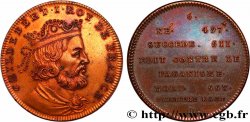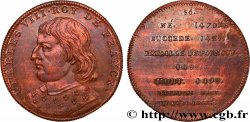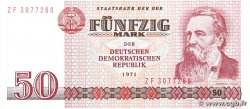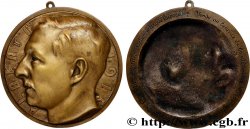E-auction 78-39012 - fjt_339282 - SÉRIE MÉTALLIQUE DES ROIS DE FRANCE Règne de PHILIPPE AUGUSTE - 41 - frappe d’origine, légère n.d.
Sie müssen angeschlossen sein und von cgb.fr genehmigt werden, um in einer E-Auktion teilzunehmen.Melden Sie sich an, um zu wetten..Die Kontobestätigungen sind innerhalb von 48 Stunden nach Ihrer Anmeldung gemacht.Warten Sie nicht bis die letzten zwei Tage vor dem Abschluss eines Verkaufs, um Ihre Registrierung abzuschließen. Klickend "BIETEN" verpflichten Sie sich vertraglich, diesen Artikel zu kaufen und Sie nehmen ohne Reserve die allgemeinen Verkaufsbedingungen für den e-auctions zu cgb.fr an.
Der Verkauf wird an der Zeit auf der Übersichtsseite angezeigt geschlossen werden. Angebote, die nach der Schließung Zeit empfangen sind, werden nicht gültig.
Bitte beachten Sie, dass die Fristen für die Einreichung Ihres Angebots auf unsere Server können variieren und es kann zur Ablehnung Ihres Angebots entstehen, wenn es in den letzten Sekunden des Verkaufs gesendet wird. Die Angebote sollen mit ganzer Zahl ausgeführt sein, Sie können Kommas oder des Punktes in Ihrem Angebot nicht erfassen. Bei Fragen klicken Sie hier, um einen Blick auf die FAQ E-Auktionen.
KEINE ANSCHAFFUNGSKOSTEN FÜR DIE KÄUFER.
KEINE ANSCHAFFUNGSKOSTEN FÜR DIE KÄUFER.
| Schätzung : | 28 € |
| Preis : | 7 € |
| Höchstgebot : | 7 € |
| Verkaufsende : | 13 Oktober 2014 15:00:00 |
| Bieter : | 3 Bieter |
Type : Règne de PHILIPPE AUGUSTE - 41 - frappe d’origine, légère
Datum: n.d.
Metall : Kupfer
Durchmesser : 32 mm
Stempelstellung : 12 h.
Gewicht : 11,80 g.
Rand cannelée
Seltenheitsgrad : R1
Vorderseite
Titulatur der Vorderseite PHILIPPE II ROY DE FRANCE.
Beschreibung Vorderseite Buste imaginaire portant bonnet et drapé à droite.
Rückseite
Titulatur der Rückseite 41 - NÉ 1165 - SUCCEDE 1180 - SECONDE CROISADE DES ROIS DE FRANCE EN TERRE SAINTE 1190 - BATAILLE DE BOUVINES 1214 - MORT 1223 - TROISIEME RACE / P..
Beschreibung Rückseite en huit lignes.
Kommentare
Philippe II dit Philippe Auguste, né le 21 août 1165 à Gonesse, mort à Mantes le 14 juillet 1223, est le septième roi de la dynastie dite des Capétiens directs. Il est le fils héritier de Louis VII dit le Jeune et d'Adèle de Champagne.
Le surnom d'« Auguste » lui a été donné par le moine Rigord après que Philippe II a ajouté au domaine royal en juillet 1185 (Traité de Boves) les seigneuries d’Artois, du Valois, d’Amiens et une bonne partie du Vermandois. Ce terme n'est pas une référence à l'empereur romain, mais signifie qu'il a accru considérablement le domaine.
Chapelain et biographe de Philippe II, Guillaume le Breton le nomme « Philippe le Magnanime » dans sa chronique La Philippide rédigée entre 1214 et 1224. Cette chronique est une continuation de celle de Rigord que Philippe II lui avait demandé d'expurger, la jugeant moins laudatrice qu'il le souhaitait.
Philippe Auguste reste l'un des monarques les plus admirés et étudiés de la France médiévale, en raison non seulement de la longueur de son règne, mais aussi de ses importantes victoires militaires et des progrès essentiels accomplis pour affermir le pouvoir royal et mettre fin à l'époque féodale.
Pour la suite de la biographie, voir http://fr.wikipedia.org/wiki/Philippe_II_de_France.
Philip II, known as Philip Augustus, born on August 21, 1165 in Gonesse and died in Mantes on July 14, 1223, is the seventh king of the dynasty known as the direct Capetians. He is the son and heir of Louis VII, known as the Younger, and Adèle of Champagne..
The nickname \\\"Augustus\\\" was given to him by the monk Rigord after Philip II added to the royal domain in July 1185 (Treaty of Boves) the lordships of Artois, Valois, Amiens and a good part of Vermandois.. This term is not a reference to the Roman emperor, but means that he greatly increased the domain.
Chaplain and biographer of Philip II, William the Breton calls him “Philip the Magnanimous” in his chronicle La Philippide written between 1214 and 1224. This chronicle is a continuation of that of Rigord which Philip II had asked him to expurgate, judging it less laudatory than he wished..
Philip Augustus remains one of the most admired and studied monarchs of medieval France, due not only to the length of his reign, but also to his significant military victories and the essential progress made in strengthening royal power and ending the feudal era..
For the rest of the biography, see http://fr. Wikipedia. org/wiki/Philippe_II_de_France
Le surnom d'« Auguste » lui a été donné par le moine Rigord après que Philippe II a ajouté au domaine royal en juillet 1185 (Traité de Boves) les seigneuries d’Artois, du Valois, d’Amiens et une bonne partie du Vermandois. Ce terme n'est pas une référence à l'empereur romain, mais signifie qu'il a accru considérablement le domaine.
Chapelain et biographe de Philippe II, Guillaume le Breton le nomme « Philippe le Magnanime » dans sa chronique La Philippide rédigée entre 1214 et 1224. Cette chronique est une continuation de celle de Rigord que Philippe II lui avait demandé d'expurger, la jugeant moins laudatrice qu'il le souhaitait.
Philippe Auguste reste l'un des monarques les plus admirés et étudiés de la France médiévale, en raison non seulement de la longueur de son règne, mais aussi de ses importantes victoires militaires et des progrès essentiels accomplis pour affermir le pouvoir royal et mettre fin à l'époque féodale.
Pour la suite de la biographie, voir http://fr.wikipedia.org/wiki/Philippe_II_de_France.
Philip II, known as Philip Augustus, born on August 21, 1165 in Gonesse and died in Mantes on July 14, 1223, is the seventh king of the dynasty known as the direct Capetians. He is the son and heir of Louis VII, known as the Younger, and Adèle of Champagne..
The nickname \\\"Augustus\\\" was given to him by the monk Rigord after Philip II added to the royal domain in July 1185 (Treaty of Boves) the lordships of Artois, Valois, Amiens and a good part of Vermandois.. This term is not a reference to the Roman emperor, but means that he greatly increased the domain.
Chaplain and biographer of Philip II, William the Breton calls him “Philip the Magnanimous” in his chronicle La Philippide written between 1214 and 1224. This chronicle is a continuation of that of Rigord which Philip II had asked him to expurgate, judging it less laudatory than he wished..
Philip Augustus remains one of the most admired and studied monarchs of medieval France, due not only to the length of his reign, but also to his significant military victories and the essential progress made in strengthening royal power and ending the feudal era..
For the rest of the biography, see http://fr. Wikipedia. org/wiki/Philippe_II_de_France








 Berichten über einen Fehler
Berichten über einen Fehler Die Seite drucken
Die Seite drucken Teilen meiner Auswahl
Teilen meiner Auswahl Stellen Sie eine Frage
Stellen Sie eine Frage Einlieferung/Verkauf
Einlieferung/Verkauf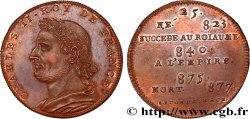
 Details
Details